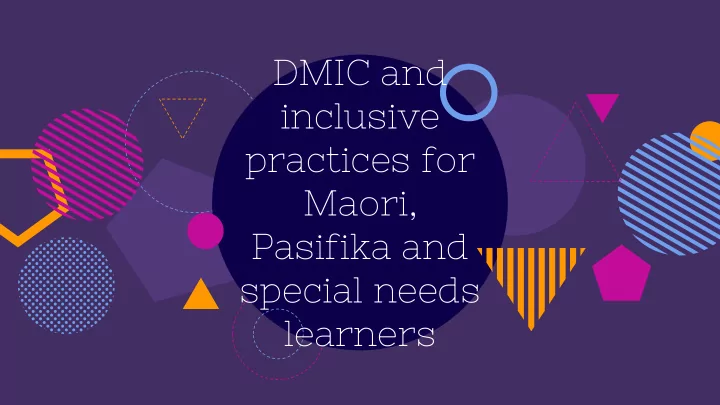

DMIC and inclusive practices for Maori, Pasifika and special needs learners
DMIC Developing Mathematical Inquiry Communities: learning mathematics together
“ •Substantial disparities in achievement between ethnic groups •11% of Pasifika and 26% of Maori achieving curriculum standards in maths at Year 8 (NMSSA)
Challenge the status quo about who can be successful in maths and what it means to do maths
Need to address deficit perceptions Teacher Student Principal These children come Being Samoan in the All of those things to school with no maths classroom that we probably maths. makes me feel thought that our different cos kids couldn’t do Samoans don’t do but we weren’t maths. giving them the opportunity to do that.
Developing Mathematical Inquiry Communities: DMIC ◍ Well connected ◍ Proficient use ◍ Inquiry rich of mathematical learning within mathematical practices mathematics thinking ◍ Mixed ability ◍ High ◍ Culturally grouping and expectations responsive group worthy and inclusion teaching and problematic learning tasks
Well connected rich mathematical thinking
Proficient use of mathematical practices Maths is about being able to explain how the answer has been arrived at, not just getting the answer.
Inquiry learning within mathematics Student centred curriculum and engaging students in investigating mathematics focused on real life learning.
Mixed ability grouping and group worthy problematic tasks
High expectations and inclusion •Use inclusive language “show us”, “we want to know”, “tell us”. •Emphasise need for individual responsibility for sense-making and collective responsibility for each other
Culturally responsive teaching and learning
I I agree because… / I disagree because… How do you know it works? Can you convince us? Why does that work like that? What about if you say… does that still work? I agree/disagree with the THINKING in that explanation because...? I know… so I think… So if we… I used… to represent my thinking. So if you say… Because… What about if… Would that be easier? Tell us what you are thinking/ more about your thinking when you say that. I can’t make sense of that. Say more I don’t think that’s right because… Who can say that again? Who can put that into their own words? Can anyone repeat what they heard (name) say? Tell us what your partner said. What is your evidence? How did you get that answer? What convinced you that was the right answer? Why did you think that strategy would work? Can you prove that? What makes you think that? Who can add on? What do other people think about that? Does anyone have a different way of looking at it? Does that make sense to you? Why? Does anyone have more evidence?
Core values and beliefs ◍ Love ◍ Reciprocity ◍ Service ◍ Inclusion ◍ Spirituality ◍ Leadership ◍ Belonging ◍ Family ◍ Respect ◍ Relationships
An ethic of care Requires cultural responsiveness in teaching that enables all students to participate, contribute and learn within the classroom. Children who participate learn.
Recommend
More recommend